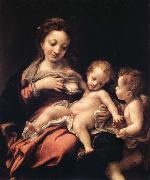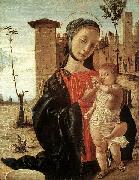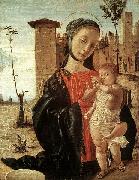Wholesale Oil Painting No Minimum |
|||||||||||
|
|
|||||||||||

|
|||||||||||
|
|
|
||||||||
CorreggioItalian 1489-1534 Correggio Locations Italian painter and draughtsman. Apart from his Venetian contemporaries, he was the most important northern Italian painter of the first half of the 16th century. His best-known works are the illusionistic frescoes in the domes of S Giovanni Evangelista and the cathedral in Parma, where he worked from 1520 to 1530. The combination of technical virtuosity and dramatic excitement in these works ensured their importance for later generations of artists. His altarpieces of the same period are equally original and ally intimacy of feeling with an ecstatic quality that seems to anticipate the Baroque. In his paintings of mythological subjects, especially those executed after his return to Correggio around 1530, he created images whose sensuality and abandon have been seen as foreshadowing the Rococo. Vasari wrote that Correggio was timid and virtuous, that family responsibilities made him miserly and that he died from a fever after walking in the sun. He left no letters and, apart from Vasari account, nothing is known of his character or personality beyond what can be deduced from his works. The story that he owned a manuscript of Bonaventura Berlinghieri Geographia, as well as his use of a latinized form of Allegri (Laetus), and his naming of his son after the humanist Pomponius Laetus, all suggest that he was an educated man by the standards of painters in this period. The intelligence of his paintings supports this claim. Relatively unknown in his lifetime, Correggio was to have an enormous posthumous reputation. He was revered by Federico Barocci and the Carracci, and throughout the 17th and 18th centuries his reputation rivalled that of Raphael. |
||||||||
|
|
||||||||
Madonna del Latte
Madonna del Latte Painting ID:: 31640 |
mk74
68.5x57cm
Budapest,Szepmuveszeti Muzeum
mk74 68.5x57cm Budapest,Szepmuveszeti Muzeum |
|||||||
|
|
||||||||
Ambrogio LorenzettiItalian Byzantine Style Painter, ca.1290-1348 Ambrogio Lorenzetti (or Ambruogio Laurati; c. 1290 ?C June 9, 1348) was an Italian painter of the Sienese school. He was active between approximately from 1317 to 1348. His elder brother was the painter Pietro Lorenzetti. His work shows the influence of Simone Martini, although more naturalistic. The earliest dated work of the Sienese painter is a Madonna and Child (1319, Museo Diocesano, San Casciano). His presence was documented in Florentine up until 1321. He would return there after spending a number of years in Siena. The frescoes on the walls of the Hall of the Nine (Sala dei Nove) or Hall of the Peace (Sala della Pace) in the Palazzo Pubblico of Siena are one of the masterworks of early renaissance secular painting. The "nine" was the oligarchal assembly of guild and monetary interests that governed the republic. Three walls are painted with frescoes consisting of a large assembly of allegorical figures of virtues in the Allegory of Good Government . In the other two facing panels, Ambrogio weaves panoramic visions of Effects of Good Government on Town and Country, and Allegory of Bad Government and its Effects on Town and Country (also called "Ill-governed Town and Country"). The better preserved "well-governed town and country" is an unrivaled pictorial encyclopedia of incidents in a peaceful medieval "borgo" and countryside. The first evidence of the existence of the hourglass can be found in one of his paintings. Like his brother, he is believed to have died of bubonic plague 1348. Giorgio Vasari includes a biography of Lorenzetti in his Lives. |
||||||||
|
|
||||||||
|
|
Madonna del Latte
Madonna del Latte Painting ID:: 82449 |
Oil on panel
Dimensions 90 x 45 cm (35.4 x 17.7 in)
cyf Oil on panel Dimensions 90 x 45 cm (35.4 x 17.7 in) cyf |
||||||
|
|
||||||||
BRAMANTINOItalian High Renaissance Painter, ca.1460-1530 Leonaert/Leonard Bramer alias Nestelghat (Dec 24, 1596, Delft - buried Feb 10, 1674, Delft) was a Dutch painter, best known for probably being one of the teachers of Johannes Vermeer, although there is no similarity between their work. Bramer's dark and exotic style is unlike Vermeer's style. Bramer was primarily a genre and history painter, but also made some unique frescos, not very often found north of the Alps. Leonaert Bramer is one of the most intriguing personalities in seventeenth-century Dutch art. He was a talented and diligent draughtsman, evidently Catholic and a life long bachelor. |
||||||||
|
|
||||||||
|
|
Madonna del Latte
Madonna del Latte Painting ID:: 83561 |
Date ca. 1490(1490)
Medium Oil and tempera on wood
Dimensions Height: 46 cm (18.1 in). Width: 35 cm (13.8 in).
cjr Date ca. 1490(1490) Medium Oil and tempera on wood Dimensions Height: 46 cm (18.1 in). Width: 35 cm (13.8 in). cjr |
||||||
|
|
||||||||
BRAMANTINOItalian High Renaissance Painter, ca.1460-1530 Leonaert/Leonard Bramer alias Nestelghat (Dec 24, 1596, Delft - buried Feb 10, 1674, Delft) was a Dutch painter, best known for probably being one of the teachers of Johannes Vermeer, although there is no similarity between their work. Bramer's dark and exotic style is unlike Vermeer's style. Bramer was primarily a genre and history painter, but also made some unique frescos, not very often found north of the Alps. Leonaert Bramer is one of the most intriguing personalities in seventeenth-century Dutch art. He was a talented and diligent draughtsman, evidently Catholic and a life long bachelor. |
||||||||
|
|
||||||||
|
|
Madonna del Latte
Madonna del Latte Painting ID:: 87401 |
. 1490(1490)
Medium Oil and tempera on wood
cyf . 1490(1490) Medium Oil and tempera on wood cyf |
||||||
|
|
||||||||
|
BRAMANTINO Italian High Renaissance Painter, ca.1460-1530 Leonaert/Leonard Bramer alias Nestelghat (Dec 24, 1596, Delft - buried Feb 10, 1674, Delft) was a Dutch painter, best known for probably being one of the teachers of Johannes Vermeer, although there is no similarity between their work. Bramer's dark and exotic style is unlike Vermeer's style. Bramer was primarily a genre and history painter, but also made some unique frescos, not very often found north of the Alps. Leonaert Bramer is one of the most intriguing personalities in seventeenth-century Dutch art. He was a talented and diligent draughtsman, evidently Catholic and a life long bachelor. Madonna del Latte . 1490(1490) Medium Oil and tempera on wood cyf |
||||||||
|
|
||||||||
|
Prev Next
|
||||||||
|
|
||||||||
|
Related Paintings to BRAMANTINO :. |
||||||||
|
|
||||||||
|
CONTACT US |




